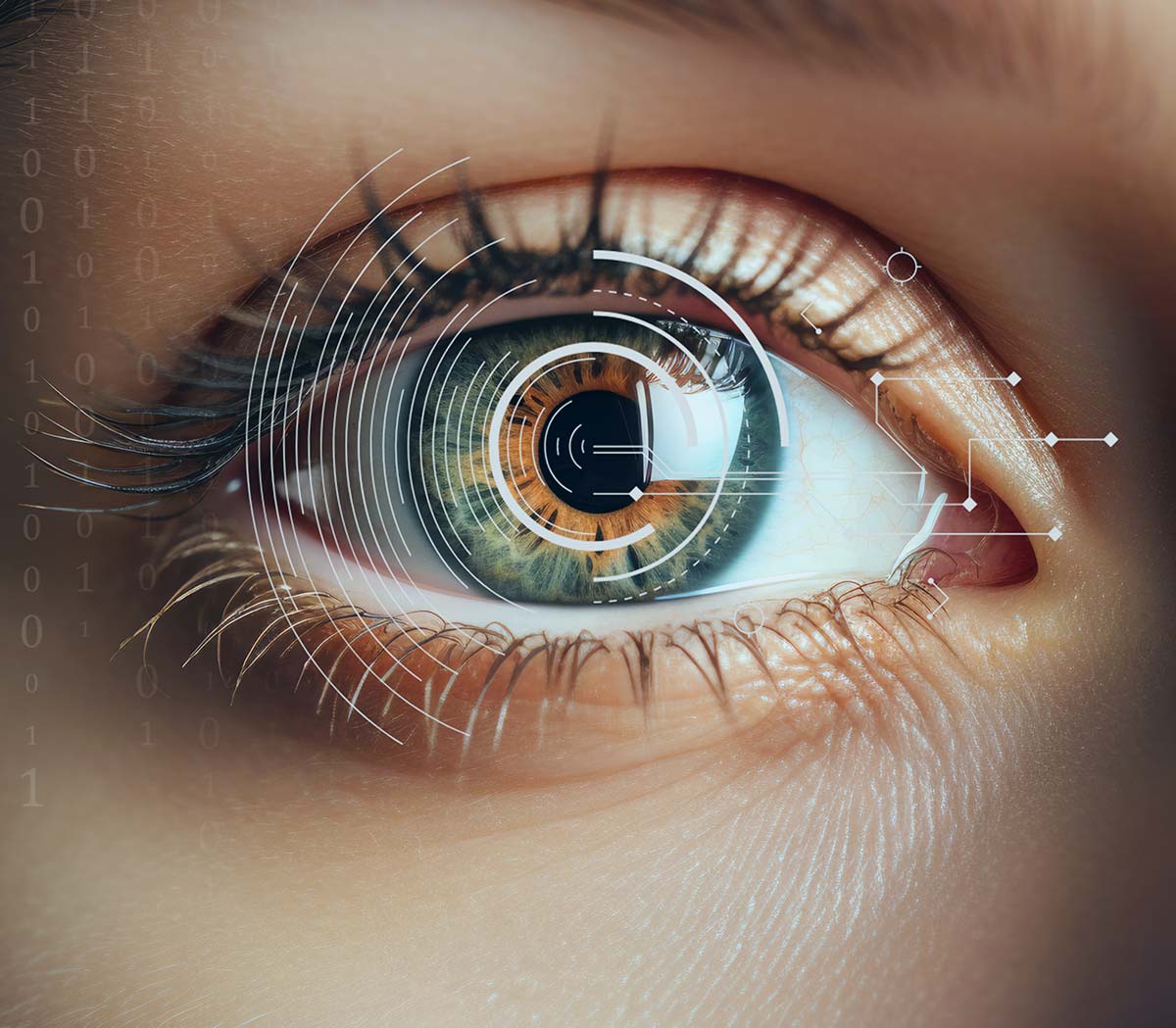LASIK

Do you use glasses and contact lenses to see things? Laser vision correction procedures like LASIK and PRK can help you achieve visual freedom from glasses and contact lenses if you qualify for these procedures
At Azure Eye Center in Fort Worth, TX, we’re proud to offer these procedures as vision correction options to our patients looking to improve their vision and lives.
What is a Laser Vision Correction Procedure?
Laser vision correction procedures refer to procedures performed at Azure Eye Center, like LASIK and PRK. These procedures correct refractive errors like nearsightedness, farsightedness, and astigmatism.
Refractive errors occur when light cannot refract or bend properly once it hits your eye because of the shape of your cornea or lens. As a result of this, it affects your ability to see clearly.
If you have refractive errors, you may have blurry or distorted vision. LASIK and PRK use excimer and femtosecond lasers to improve your vision and correct refractive errors.
The combination of these highly precise lasers corrects your refractive errors and, most importantly, improves your vision beyond what glasses and contact lenses were able to achieve on their own.
Laser vision correction procedures like LASIK and PRK are permanent procedures, although they cannot treat age-related eye conditions like presbyopia or cataracts. They only reshape the cornea to correct refractive errors.

What is PRK?
PRK is a laser vision correction procedure performed at Azure Eye Center. Although it shares some similarities with LASIK, PRK is a different procedure.
During PRK, the cornea’s epithelium is removed. Removing the epithelium provides access to the underlying cornea to reshape it and correct refractive errors. The epithelium will regenerate during the healing process.
How are PRK and LASIK Different?
Although LASIK and PRK correct refractive errors, this is where many similarities end. One of the most significant differences between PRK and LASIK is creating a flap. During PRK, there is no flap created. LASIK involves the creation of a flap, which provides access to the middle layers of the cornea to reshape them.
Another difference between LASIK and PRK is the recovery time. Recovering from PRK can take several weeks, during which you may experience discomfort.
Recovering from LASIK is usually much faster, with patients experiencing almost instant visual improvement. However, even though it takes longer to recover after PRK, it produces identical results to LASIK.
It is often recommended for patients that do not qualify for LASIK due to larger pupils, thin corneas, or dry eye syndrome.
PRK Steps
What is LASIK?
LASIK is a permanent laser vision correction procedure that corrects refractive errors by reshaping the cornea. These refractive errors include nearsightedness, farsightedness, and astigmatism.
LASIK uses an excimer laser and a femtosecond laser to reshape the cornea and correct refractive errors. Most LASIK patients end up with 20/20 vision or better.
Who is a Good Candidate for the Procedure?
LASIK is a truly life-changing procedure. But to ensure it’s as effective and low-risk as possible, it’s not something that just anyone can undergo.
Before you can get LASIK, you’ll have to qualify as a candidate for the procedure. The only way to find out if you’re a good LASIK candidate is to have a LASIK consultation at Azure Eye Center.
Factors Affecting LASIK Candidacy
You must be at least 18 years old to have LASIK. Getting LASIK before this point may make your vision unstable after the procedure and make it less effective.
Teenagers are not good LASIK candidates because of hormones created during puberty that can cause your eyes to change. You may not be a good LASIK candidate if you suffer from age-related eye conditions like presbyopia. LASIK only corrects refractive errors and cannot treat these conditions.
To examine the optic nerve at the back of your eye, your eye doctor will give you dilation drops to enlarge your pupil. Then, they will use a microscope called a slit lamp and special lenses to check for any signs of damage to your optic nerve.
If you’re pregnant or nursing, you should wait to have LASIK. Pregnancy creates hormones that can change your prescription.
If you’re nursing, wait to have LASIK for three months after you’ve finished nursing. For the best results, get LASIK once you’re sure you won’t have any more children and you know your eyesight is no longer fluctuating due to hormones.
In Good Health
To undergo any surgical procedure, LASIK included, you must be in good enough health to recover. You may not be a good candidate for the vision correction procedure if you have autoimmune conditions like Sjogren’s syndrome, lupus, or rheumatoid arthritis.
In addition to being in good health, you must also have healthy eyes to have LASIK. If you have a pre-existing eye condition like age-related macular degeneration, glaucoma, or keratoconus, you should not have LASIK.
If you have dry eyes, you may qualify as a LASIK candidate once the condition is controlled and managed.
A crucial component of the LASIK procedure is your LASIK surgeon creating a flap in the cornea. If you have corneas that are too thin, it makes LASIK unsafe.
Removing even a small portion of tissue from the cornea can result in severe visual consequences, like vision loss and other complications. Only a LASIK consultation can measure your corneas to determine their thickness, so it’s not something you can figure out on your own.
If you learn your corneas are not an adequate thickness for LASIK, talk to your ophthalmologist at Azure Eye Center about alternative procedures like PRK that you may be a better candidate for instead.
What to Expect During LASIK?
LASIK is a minimally invasive outpatient procedure performed by the expert team at Azure Eye Center. Before the procedure begins, we’ll numb your eyes using eye drops.
With these eye drops, you won’t be able to feel any pain during your LASIK procedure. After the drops cover the surface of your eye, your LASIK surgeon will place a small suction ring around your eye to hold it in place.
We’ll begin by using a femtosecond laser to create a small flap in the cornea and then folding the flap back. You’ll be asked to stare at a target light to keep your eye from moving.
While you’re staring at the light, we’ll use the excimer laser to dissolve and remove a precise amount of tissue from the cornea to correct your vision. The excimer laser is pre-programmed with measurements taken during your LASIK consultation to act as a roadmap for the most accurate results possible.
After reshaping the cornea, your surgeon will fold the flap to heal without stitches or sutures. The LASIK procedure only takes a few minutes per eye, and most patients start seeing almost instant improvements in their vision.

What is the Recovery Process Like After LASIK?
Resting right after LASIK will help you start your recovery off strongly. When you wake up, you may notice that your eyes feel itchy, scratchy, or irritated. These are all normal feelings and will improve over the next several days. You can use artificial tears or eye drops to reduce irritation but avoid rubbing your eyes at all costs.
Rubbing your eyes could dislodge the delicate flap while it’s still healing. Avoid activities like getting water in your eyes, wearing makeup, and strenuous exercise for at least a week.
Your eye doctor will tell you when it’s safe to return to these tasks. Make sure to attend all follow-up appointments, as they’ll help your ophthalmologist at Azure Eye Center determine if your eyes are healing.
You’ll receive anti-inflammatory, and antibiotic eye drops that you must take as directed by your eye doctor. Make sure to ask any questions about your recovery, vision, or side effects.
Are you ready to determine which laser vision correction procedure is right for you? Schedule your consultation at Azure Eye Center in Fort Worth, TX, now!
Request A
Consultation
To request a consultation with Azure Eye Center, please click link below.


